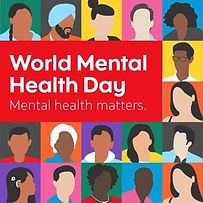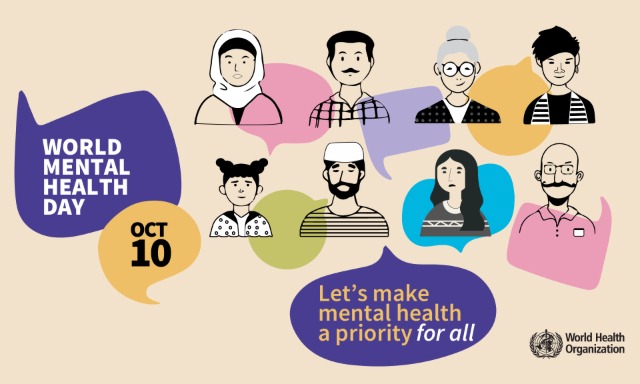Earlier this week marked International Mental Health Day and that got me reflecting on the idea of mental health more generally. Before I go any further, I want to be clear – I’m not a specialist or medical doctor so everything I share is just my opinion. I’m qualified to share my musings on the human condition solely by virtue of being one, and of having struggled with my own diagnosed issues in the form of severe anorexia and bulimia for many years.

The tagline here is “mental health matters.” I couldn’t agree more. I don’t want a single person out there to suffer, as much for the empathy I have for my fellow humans, as for the fact that I know that healthy happy people have so much more to contribute and that it is hurt people who hurt people. We’re moving from a time when people struggling with issues of mental health were often stigmatized and trivialized. That’s not helpful. But I am not certain that the response that I am seeing now is necessarily the most useful either.
Of late I’m hearing a lot of conversation around the idea that we wouldn’t tell someone to just get over their physical ailments and nor should we tell people to just get over their mental ones. I like the parallels being drawn between our physical and our mental wellness for so many reasons. While we don’t typically tell someone to just get over their physical ailments, we also tend to recognize these as being on a spectrum. We don’t get worked up about a small injury because we know that we will heal from it. We talk about ourselves as being “sick” when we succumb to a cold, but we don’t define ourselves as an “ill person” because, again we know that the system will work to restore balance and we will recover (clearly, I’m not talking about fatal disease or injury here, but even that is on the spectrum – we are all in the process of dying every day). While we don’t blame people for their physical symptoms, we don’t discourage them from taking some ownership over their physical health either. It’s encouraged to eat in healthy ways, and exercise, and wear protective gear if you are engaging in an activity where you might get injured. We understand that, while resilient, we have a role to play in optimizing the health and wellbeing of our physical system.
We can do the same with our mental wellbeing – we can talk about ways we are contributing to our own mental health by being more aware of how each of us, as a system, works. We can see the ways we are helping or hindering our mental wellbeing without being accused of blaming the victim.
First and foremost, I think it is important to recognize the interconnectedness of our physical and mental systems. I am most mentally resilient when I am physically well – when I am eating properly, getting enough exercise and sleep etc. I also know that I am most mentally well when I am taking care of my spiritual self and, for me, that means spending less time thinking about me and more time thinking about others.
But I want to focus on how I have, over the course of my Common Earth journey, come to think about mental health. I don’t believe that it is something we have or we don’t have – as with our physical selves, it is a spectrum. And if we are all on this same spectrum, where we experience moments of helpful and not helpful thinking, then when do we cross over from being mentally healthy to mentally unwell? Some might argue that it’s when our thoughts start to interfere with our ability to function. I for one have had days when I would consider myself unable to function; days where I have called in sick – not for any physical reason, but because I just simply couldn’t face the day. While I wasn’t able to function, I wouldn’t have characterized myself as having an issue with my mental health, so then is it just a matter of length of time that we are experiencing disordered thinking?
Maybe – but time denotes habits for me. We all have disordered thinking, and we all have ups and downs in our mood. That is the way we, as systems, operate. But what we choose to focus on and listen to becomes a reinforcing loop that then becomes habitual. We have some agency over this. Recently, I was with one of my favourite people when she recognized a really un-useful thought that popped into her head. She looked at me and said,
“ I am going to be gentle with myself because I didn’t put that thought there.”
I love this. We have the ability to distance ourselves from our thoughts and make objective rational decisions about which ones we want to listen to, which ones we give credence to, and which ones we discard as not particularly useful to us. I know that this can be easier said than done, but the more that we recognize that we are NOT our thoughts the easier this becomes. And the more able we are to be fully present and happy in the now because we aren’t caught up in regretting the past or worrying about the future (where much of my disordered thinking takes me).
And this is the best reinforcing feedback loop I know. It allows me to joyfully engage in hard stuff and help others to do the same, which in small ways makes all the nested systems I am a part of better, which then helps me feel better about myself and my place in the universe, which – well, you get the idea….


